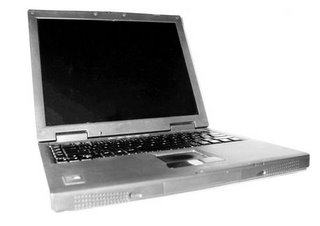Feature: Conserving your Laptop's Battery Power
Whether you’re going on a long trip or lounging around the house, these tips will help you achieve a longer battery life for your laptop.
[Note: Many of these tips are aimed at Windows users, although some apply to all systems]
Use Windows’ power options – Windows XP comes with built-in power saving ‘schemes’ as they’re called. Go to Start > Control Panel > Performance and Maintenance > Power Options and you’ll see an option for changing your power scheme. The two relevant schemes are ‘Laptop/Portable’ and ‘Max Battery’. Laptop/Portable should be adequate for most situations; only use Max Battery when you need very minimal processing power.
Use standby & hibernate – If you’re going to be leaving your battery-running laptop momentarily, put it in Standby mode first. Your programs and files are stored in RAM for easy access when you start the computer up again. If your laptop is going to be unused for a longer period of time, consider Hibernate mode, which saves everything to the hard drive first. Both modes are low-power use, and a better option than simply leaving your computer on.
access when you start the computer up again. If your laptop is going to be unused for a longer period of time, consider Hibernate mode, which saves everything to the hard drive first. Both modes are low-power use, and a better option than simply leaving your computer on.
Turn down your brightness – One of laptops’ two biggest energy consumers is your screen. By turning the brightness level down to your minimum acceptable level, you can extend your battery life drastically, sometimes by up to 50%. Most laptops have a quick-access key of some sort, like a ‘function’ or ‘option’ key, to do this using just the keyboard.
Exit unused programs – Many programs that you wouldn’t normally be bothered by will drain your battery quicker than needed. Check your notification bar – the groups of program icons by the system clock – and remove any programs that you don’t need to have running. Programs that continuously access the hard drive, such as Google Desktop and MSN Desktop, will put a strain on your battery. See if you can live without them.
Turn off sounds – Muting everything using your system’s volume control will prevent the system from using any power to play sounds for you. If you must have some sound, consider headphones, as they use much less energy than your laptop’s built-in speakers.
Turn off network connections – If you’re not going to be perusing the internet, disable your notebook’s built-in wireless card and Bluetooth, if it has them. Most computers will have a quick access button or button combination for these.
Unplug accessories – PDAs, PCMCIA cards, and other accessories can drain your batteries even if you’re not actively using them. It’s generally best to plug these devices in only when you plan to be using them.
Avoid using CDs & DVDs – It takes a lot of energy to spin CDs and DVDs fast enough to read them. If you can, try to avoid using them while on battery power. One option is to copy the information to your hard drive before you go on battery power. This is easy to do for CDs, but for DVD movies, it can be harder. You’ll need a program like DVD Decrypter.
 Consider upgrading your RAM – When your computer does not have enough RAM (random access memory), it will store information on your hard drive instead. Because hard drives have moving parts, as opposed to RAM, it takes more energy to read something from the hard drive than it does to read from RAM. 512MB of RAM should be enough for most users, but power users may need 1GB of RAM or more.
Consider upgrading your RAM – When your computer does not have enough RAM (random access memory), it will store information on your hard drive instead. Because hard drives have moving parts, as opposed to RAM, it takes more energy to read something from the hard drive than it does to read from RAM. 512MB of RAM should be enough for most users, but power users may need 1GB of RAM or more.
Turn off scheduled tasks – Some programs have scheduled tasks that automatically start up at a certain time. To avoid having these run while you’re on battery power, go to Start > All Programs > Accessories > System Tools > Scheduled Tasks. Right-click on each task you want to change, go to Properties, and then to Settings. Check the box marked ‘Don’t start the tasks if computer is running on batteries’.
Turn off auto-save – Microsoft Word and other programs have auto-save features which will save a copy of your document to the hard drive at certain intervals. Because hard drive use will drain your battery quicker, consider turning these options off. Of course, be wary if you’re working on an important document.
[Note: Many of these tips are aimed at Windows users, although some apply to all systems]
Use Windows’ power options – Windows XP comes with built-in power saving ‘schemes’ as they’re called. Go to Start > Control Panel > Performance and Maintenance > Power Options and you’ll see an option for changing your power scheme. The two relevant schemes are ‘Laptop/Portable’ and ‘Max Battery’. Laptop/Portable should be adequate for most situations; only use Max Battery when you need very minimal processing power.
Use standby & hibernate – If you’re going to be leaving your battery-running laptop momentarily, put it in Standby mode first. Your programs and files are stored in RAM for easy
 access when you start the computer up again. If your laptop is going to be unused for a longer period of time, consider Hibernate mode, which saves everything to the hard drive first. Both modes are low-power use, and a better option than simply leaving your computer on.
access when you start the computer up again. If your laptop is going to be unused for a longer period of time, consider Hibernate mode, which saves everything to the hard drive first. Both modes are low-power use, and a better option than simply leaving your computer on.Turn down your brightness – One of laptops’ two biggest energy consumers is your screen. By turning the brightness level down to your minimum acceptable level, you can extend your battery life drastically, sometimes by up to 50%. Most laptops have a quick-access key of some sort, like a ‘function’ or ‘option’ key, to do this using just the keyboard.
Exit unused programs – Many programs that you wouldn’t normally be bothered by will drain your battery quicker than needed. Check your notification bar – the groups of program icons by the system clock – and remove any programs that you don’t need to have running. Programs that continuously access the hard drive, such as Google Desktop and MSN Desktop, will put a strain on your battery. See if you can live without them.
Turn off sounds – Muting everything using your system’s volume control will prevent the system from using any power to play sounds for you. If you must have some sound, consider headphones, as they use much less energy than your laptop’s built-in speakers.
Turn off network connections – If you’re not going to be perusing the internet, disable your notebook’s built-in wireless card and Bluetooth, if it has them. Most computers will have a quick access button or button combination for these.
Unplug accessories – PDAs, PCMCIA cards, and other accessories can drain your batteries even if you’re not actively using them. It’s generally best to plug these devices in only when you plan to be using them.
Avoid using CDs & DVDs – It takes a lot of energy to spin CDs and DVDs fast enough to read them. If you can, try to avoid using them while on battery power. One option is to copy the information to your hard drive before you go on battery power. This is easy to do for CDs, but for DVD movies, it can be harder. You’ll need a program like DVD Decrypter.
 Consider upgrading your RAM – When your computer does not have enough RAM (random access memory), it will store information on your hard drive instead. Because hard drives have moving parts, as opposed to RAM, it takes more energy to read something from the hard drive than it does to read from RAM. 512MB of RAM should be enough for most users, but power users may need 1GB of RAM or more.
Consider upgrading your RAM – When your computer does not have enough RAM (random access memory), it will store information on your hard drive instead. Because hard drives have moving parts, as opposed to RAM, it takes more energy to read something from the hard drive than it does to read from RAM. 512MB of RAM should be enough for most users, but power users may need 1GB of RAM or more.Turn off scheduled tasks – Some programs have scheduled tasks that automatically start up at a certain time. To avoid having these run while you’re on battery power, go to Start > All Programs > Accessories > System Tools > Scheduled Tasks. Right-click on each task you want to change, go to Properties, and then to Settings. Check the box marked ‘Don’t start the tasks if computer is running on batteries’.
Turn off auto-save – Microsoft Word and other programs have auto-save features which will save a copy of your document to the hard drive at certain intervals. Because hard drive use will drain your battery quicker, consider turning these options off. Of course, be wary if you’re working on an important document.
Have any tips of your own? Add them in the comments!




0 Comments:
Post a Comment
<< Home